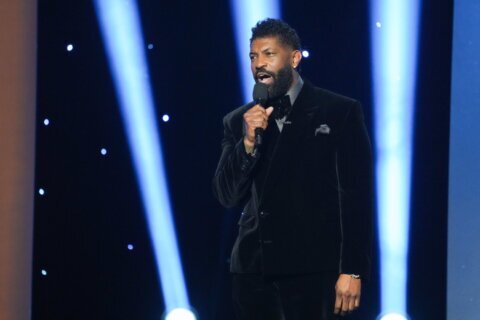The past seven months have seen the end of one war and the beginning of another, as the U.S. pulled troops out of Afghanistan in Aug. 2021, while Russia recently invaded Ukraine.
Now, the Virginia group Classical Movements is addressing both refugee crises with Secret Garden Concerts in the Rectory’s Atrium on Princess Street in Old Town, Alexandria.
“We are going to be 30 years old in October,” President Neeta Helms told WTOP. “We normally take the world’s great symphony orchestras and choirs on tour to work in 145 countries. We had tours cancel in March 2020. … I decided that we could do live music safely in our very beautiful Secret Garden. … We’ve had 95 since COVID started.”
This Thursday, the group welcomes Afghan refugee musician Hamid Raouf Habib Zada with guitarist Wadih Ettabbakh for a special concert called “Flamenco Meets Tabla.”
“Hamid Raouf Habib Zada is a fabulous tabla player,” Helms said. “His wife was the first female orchestra conductor in Afghanistan. She made so much news because they had a female orchestra, which was extraordinary in Afghanistan after those years of the Taliban. … She was one of the first to escape. … They came to the United States in August.”
On March 22, the group will present “A Concert for Ukraine,” featuring talented musicians from the National Symphony Orchestra and the Washington National Opera.
“We just wanted to do a concert to help and be symbolic, just as a gathering place for people to talk and hear music as solace,” Helms said. “It was important to have Ukrainian music and Ukrainian musicians. … The Ukrainian musician we have, Zino Bogachek, is a violinist in the Washington National Opera and Kennedy Center Opera House Orchestra.”
Classical Movements has explored Russia and Ukraine since its very inception in 1992, when Helms joined Jacques Vallerand-Parisi to found Blue Heart Travel, Inc. in Dupont Circle to coordinate concert tours to both nations one year after the Soviet Union fell.
“When I started this company [and] made my first visit to the Soviet Union, there was such hope,” Helms said. “Things were changing dramatically. … Americans could finally visit these countries that have such incredible art, architecture, music, literature.”
She created a tour that visited the Russian cities of St. Petersburg and Moscow, as well as Kyiv, Ukraine.
“It all seemed so friendly, so idealistic, such hope, democracy all around,” Helms said. “So, for me, the beautiful city of Kyiv, such a soulful city, so old and such a treasure in terms of its art and churches and streets, it’s really crushing to see what’s happening now.”
In 1993, she took the Choral Arts Society of Washington to Russia again, this time alongside the National Symphony Orchestra conducted by Mstislav Rostropovich, the cellist who had defected from the Soviet Union 19 years earlier. Together, they performed in Red Square for 100,000 people, including former Russian President Boris Yeltsin.
“The concert in Red Square was the first that anyone in Russia had seen that didn’t involve tanks and a military parade,” Helms said. “Three weeks out, there was a coup d’état of hardliners. … The tour almost got canceled, but in the end we went ahead. The Kremlin was closed. … Yeltsin came to that concert even as there were tanks in the rest of his city.”
She sees tragic echoes between Russia then and now.
“The hardliners didn’t like this democracy and didn’t like Russia becoming one smaller country,” Helms said. “This is the same thing happening now. This is a reflection of a lot of people like Vladimir Putin, who did not like the breakup of the Soviet empire.”
In her own little way, Helms is now doing whatever she can in Virginia to bring awareness and raise money for the double refugee crises in both Ukraine and Afghanistan.
“We are raising funds and going to make it possible for people to buy tickets and make a donation,” Helms said. “We’ve chosen, with guidance from Ukrainians, Doctors Without Borders. They’re underground inside Ukraine doing miraculous work that’s needed right now. They’re brave people themselves, so that was the consensus to donate to them.”
Listen to our full conversation here.







